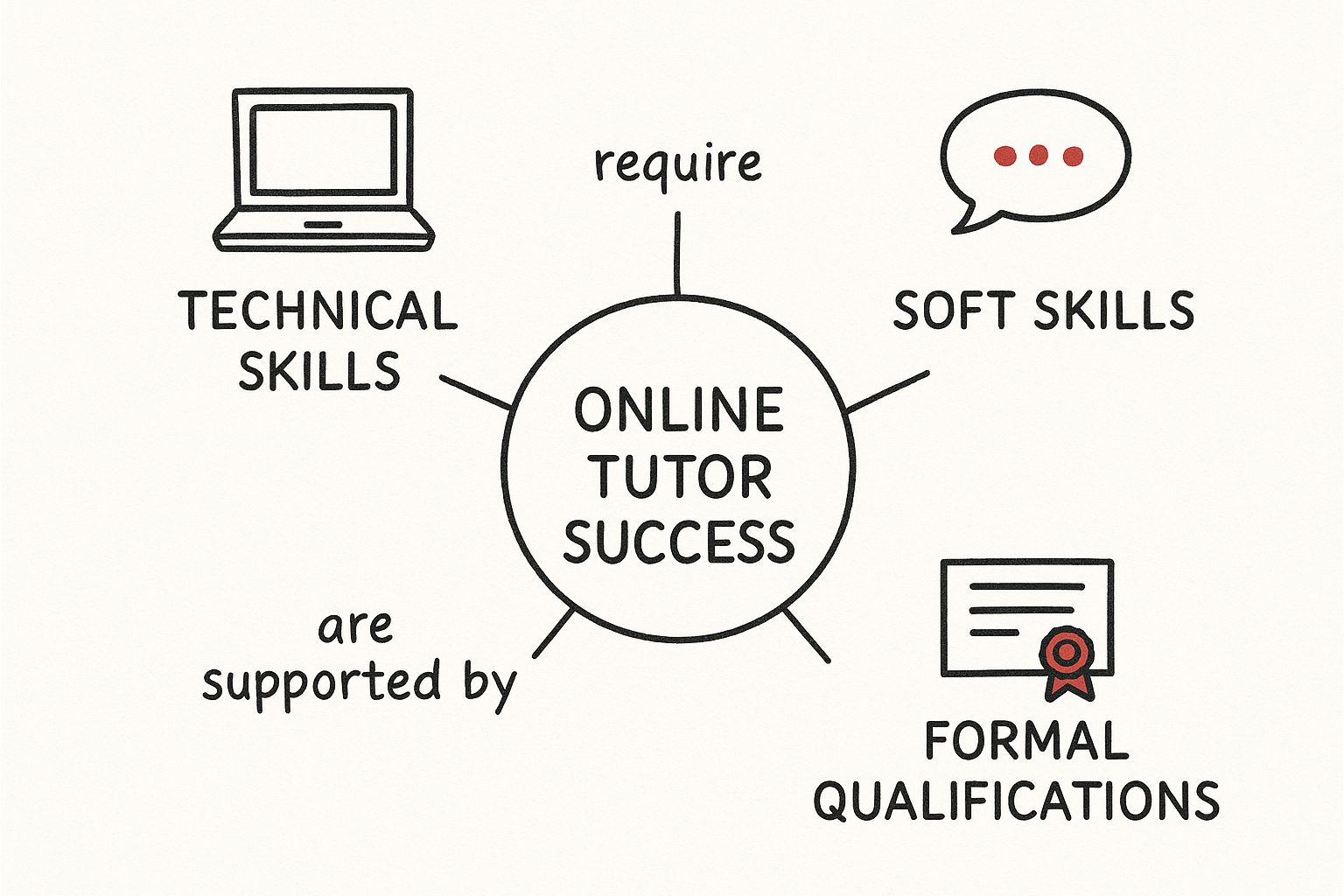Finding Online Tutoring Opportunities in Singapore
It’s no secret that the way we learn is changing. In a place as forward-thinking as Singapore, the demand for high-quality, flexible education has exploded, and online tutoring is right at the heart of it. For educators looking for a career that fits their life, not the other way around, this shift is a massive opportunity to connect with students and build a meaningful business from home.
To succeed, you need to get what’s driving this growth and figure out where you fit in.
Why Online Tutoring is Booming in Singapore
Not too long ago, online tutoring felt like a niche option. Now, it's a mainstream choice for families all across the island. This isn't just a passing fad—it's a real shift in how we approach education, driven by some powerful changes in technology and family life.
Think of it this way: the old-school tuition centre is like a fixed bus route. It has a rigid schedule and only goes to certain stops. Online tutoring is more like booking a Grab—it’s personalised, on-demand, and fits perfectly into the busy, often unpredictable, schedules of modern Singaporean families.
The Core Drivers of Growth
So, what’s created this perfect storm for online tutoring? It’s not just one thing, but a mix of incredible infrastructure, a deep-seated culture of learning, and the practical needs of today’s families.
Here’s a breakdown of what’s fuelling this expansion:
- Exceptional Digital Infrastructure: Singapore’s world-class internet means virtual lessons are actually smooth and reliable. No more frustrating lag or glitchy video calls that kill the learning momentum.
- Cultural Emphasis on Academic Success: Let's be honest, education is a top priority here. Parents are always looking for the best possible support to help their kids get ahead.
- Demand for Unmatched Flexibility: Life is busy. Families are juggling CCAs, work commitments, and social lives. Online tutoring frees them from the rigid timetables of a physical centre, letting them schedule lessons whenever and wherever works best.
- Access to Specialised Educators: A student in Jurong can now learn from the best Spanish tutor in Pasir Ris without anyone having to commute. Geographical barriers have completely disappeared, opening up a much larger pool of expert talent.
This blend of factors has created a seriously dynamic market, and the numbers back it up.
The Singapore online education market, which is packed with online tutoring opportunities, was valued at USD 383.03 million and is expected to soar to an incredible USD 2,774.68 million by 2033. That’s a compound annual growth rate (CAGR) of 24.61%. For a deeper dive, check out this detailed report about Singapore's online education growth on imarcgroup.com.
A New Era for Educators
For anyone with teaching skills, this is the moment to get involved. The demand for great tutors who know their way around a digital classroom is higher than ever. It's a real chance to build a flexible career that makes an impact and suits a modern lifestyle.
And if you have a specialised skill, like teaching Spanish, the opportunities are even bigger. You can connect with students cramming for exams or help families give their children a head start with a new language. You’re not just teaching; you’re becoming a key part of Singapore’s evolving learning story.
Skills You Need to Succeed as an Online Tutor
To really thrive as an online tutor, you need more than just deep knowledge of your subject. Of course, being an expert is the foundation, but the virtual classroom has its own set of rules. It demands a specific mix of tech-savviness, sharp people skills, and the right qualifications to earn the trust of parents and students here in Singapore.
Think of it this way: moving from in-person teaching to online tutoring is like a seasoned chef moving into a brand-new, high-tech kitchen. The chef still knows the recipes inside and out (that’s your subject expertise), but they have to get comfortable with the induction stove, smart oven, and new gadgets to create the same fantastic meal. Online tutors are no different—mastering the digital tools is essential for a great lesson.
This breakdown shows the three pillars that hold up a successful online tutoring career.
As you can see, it's not about being good at just one thing. True success comes from blending technical skill, strong personal connection, and credible qualifications into a seamless and powerful learning experience for your students.
Mastering the Technical Essentials
First things first: you have to be comfortable with the technology. Nothing derails a lesson faster or shatters a student’s confidence in you more than constant technical hiccups. This part is simply non-negotiable.
Your basic tech toolkit should include:
- Communication Platforms: You need to be completely at ease with tools like Zoom, Google Meet, or Skype. This means going beyond just starting a call—you should be able to effortlessly manage screen sharing, breakout rooms, and the chat function to make learning interactive.
- Virtual Whiteboards: Tools like Miro or the whiteboards built into video-conferencing software are your new blackboard. You must be able to write, draw, and share materials on them fluidly to break down tricky concepts.
- Learning Management Systems (LMS): Some tutoring companies use an LMS to keep everything organised—from lesson plans and homework to tracking student progress. Getting familiar with these shows you're professional and on top of your game.
For tutors looking to make the leap to online teaching, understanding how the required skills differ is crucial. Here’s a quick comparison.
Essential Skills for Online vs Traditional Tutoring
| Skill Area | Traditional Tutoring Requirement | Online Tutoring Requirement |
|---|---|---|
| Instructional Delivery | Relies on physical presence, body language, and tangible materials. | Requires mastery of digital tools, screen sharing, and virtual whiteboards. |
| Student Engagement | Uses direct interaction, group activities, and physical learning aids. | Demands creating digital polls, interactive quizzes, and using breakout rooms. |
| Communication | In-person verbal and non-verbal cues are key. | Needs crystal-clear verbal communication and proactive use of chat features. |
| Material Management | Organising physical worksheets, textbooks, and notes. | Involves managing digital files, cloud storage, and LMS platforms efficiently. |
This table really highlights that while the core goal of teaching remains the same, the how changes dramatically. Online tutoring isn't just traditional tutoring on a screen; it's a whole new craft.
Cultivating Essential Soft Skills
Technology gives you the stage, but it's your soft skills that bring the performance to life. Keeping a student focused and engaged through a screen is a totally different ball game than doing it in person. It takes a good dose of creativity, empathy, and rock-solid communication to build that all-important rapport.
Bringing in a few interactive online training tips can make a world of difference, turning a session from passive screen-watching into an active, memorable lesson.
The best online tutors aren't just subject experts; they're masters of digital teaching. They know how to adapt their style for the online world, using technology not as a barrier, but as a bridge to spark curiosity and build real connections with their students.
Here are the soft skills that truly matter:
- Digital Engagement: The ability to design dynamic lessons using polls, quick quizzes, and other interactive features.
- Clear Communication: Speaking with clarity and confidence, and knowing how to give feedback that is both constructive and encouraging.
- Time Management: Juggling schedules for multiple students, planning your sessions ahead of time, and staying organised.
- Patience and Empathy: Really trying to understand a student’s difficulties from afar and being flexible enough to change your teaching approach to help them.
Acquiring Formal Qualifications
In Singapore’s highly competitive education scene, parents and tutoring platforms want to see proof of your expertise. Your qualifications are a shortcut to building trust, showing clients that you have a verified background and know your stuff.
Typically, this means having:
- A university degree in your teaching subject or a closely related field.
- A relevant teaching certification, such as a Postgraduate Diploma in Education (PGDE).
- Specialised training for certain subjects. For example, if you want to tutor Spanish, having specific language teaching certifications will set you apart. To get a better feel for what students are up against, check out our guide on whether https://spanish.sg/blog/is-spanish-easy-to-learn.
While solid local data on online tutoring is still emerging, the big picture is clear. The K-12 online tutoring market in Singapore is set for major growth between 2025-2031, pushed by a growing desire for personalised, digital-first learning. This trend just goes to show how vital it is to have the right blend of skills to meet what's becoming a huge demand.
How to Find and Choose the Right Tutoring Platform
Jumping into online tutoring is exciting, but the sheer number of platforms out there can feel like a maze. Picking the right one isn't just a small detail—it's a massive decision that will shape your income, your schedule, and how much you actually enjoy your work.
Think of it like choosing the right storefront for a new business. The location, the rent, and the type of customers it attracts will all make or break your success. Not all platforms are built the same, so understanding their differences is the first step to finding a home that fits your teaching style and financial goals.
Understanding the Platform Types
First things first, you need to know the two main kinds of platforms you'll encounter. They each have their own pros and cons, and your choice really comes down to how much control you want versus how much support you need.
-
Marketplace Platforms: Picture these as a bustling open-air market. You set up your own stall (your profile), decide on your prices, and students browse through to find a tutor they like. This route gives you tons of freedom, but you’ll have to put in the work to market yourself and stand out from the competition.
-
Agency Platforms: These are more like a traditional tuition centre that’s gone digital. The platform finds the students, often provides the curriculum, and then assigns them to you. You get a steady stream of work with less hassle, but they’ll take a larger cut and you have less say over your rates and timetable.
The global demand for online tutoring is booming. The market was valued at around USD 8.51 billion in 2023 and is expected to rocket to USD 28.87 billion by 2032. While we don't have exact figures for Singapore, our digital-first economy suggests we're right on trend.
Key Criteria for Evaluating Platforms
Once you have a feel for whether you’re a marketplace or an agency person, it’s time to get into the nitty-gritty. Use this checklist to really size up your options.
-
Commission Structure and Fees: This is all about your bottom line. How much of the fee do you actually get to keep? Some platforms take a flat cut—anything from 15-40% is common. Others use a sliding scale, where the percentage they take goes down the more you teach. Always read the fine print so there are no nasty surprises.
-
Student Acquisition Process: How will you get students? On a marketplace, it’s all about how visible your profile is. For an agency, you need to understand how they match you with learners. Will they respect your expertise, or will you end up teaching topics outside your comfort zone?
-
Teaching Tools and Technology: A platform's virtual classroom is your workspace, so it has to be good. A key part of your decision involves choosing your video platform for education because that's where the magic happens. Look for must-haves like a stable video connection, an interactive whiteboard, and an easy way to share files.
A platform with clunky, outdated tech can sour a brilliant lesson in seconds, frustrating both you and your student. Always favour platforms that invest in a smooth, user-friendly experience.
Spotting Red Flags and Making Your Choice
As you start to narrow down your list, keep your eyes peeled for red flags. Vague payment terms, non-existent tutor support, or a sea of negative reviews from other tutors are all warning signs to steer clear.
The right platform should feel like a partner, not just a middleman taking a cut. If you're teaching something specific like Spanish, a sense of community can be a game-changer. Sometimes, connecting with peers through a language exchange in Singapore can give you the inside scoop on which platforms genuinely support specialised tutors.
Ultimately, the goal is to find a platform that respects your skills, gives you the tools to do your best work, and helps you build a career that’s both fulfilling and financially sound. Take your time, do the research, and choose a place that will help you shine.
Creating a Tutor Profile That Attracts Students
Getting accepted onto a tutoring platform is a great first step, but it’s just that—the start. In a marketplace packed with options, your profile is your storefront, your handshake, and your pitch all rolled into one. A powerful profile doesn’t just list your qualifications; it tells a story that reassures parents you’re the right person to guide their child.
Think of it like a movie trailer. It needs to be engaging, show off your best features, and leave parents feeling confident enough to book a session. A dry, text-heavy profile is like a trailer with no action or music—it just won’t get noticed. Crafting a standout profile is one of the most crucial parts of making the most of online tutoring opportunities and building a solid career.
This is about going beyond a simple list of degrees and past jobs. It's about showing off your personality and making a real connection before the first lesson even begins.
Crafting a Compelling Bio and Introduction
Your bio is where you make that critical first impression. This is your chance to show not just what you know, but who you are as an educator. Ditch the academic jargon and focus on writing a warm, approachable story that lets your passion and expertise shine through.
A bio that really works will usually include:
- A Personal Touch: Start with a line about why you love your subject. Why are you so passionate about teaching Spanish? What sparked that interest?
- Clear Expertise: Talk about your qualifications, but frame them around how they help students. Instead of just saying "M.A. in Spanish," you could write, "My Master's in Spanish helps me break down tricky grammar into simple concepts students can actually use."
- Your Teaching Philosophy: Give a quick rundown of your approach. Do you focus on conversation, use games, or connect lessons to real-world situations? This helps parents see if your style is a good fit for their child.
In an online setting, students need to feel a connection with the real person behind the screen. An introductory video is one of the most powerful tools for building this trust instantly. It allows your personality to shine through in a way text simply cannot.
A short, polished video can make a huge difference. Keep it brief—60 to 90 seconds is perfect—and make sure the lighting is good and the audio is crystal clear. Just relax and let your enthusiasm for teaching come through naturally.
The Power of Professional Visuals
First impressions are almost entirely visual. A blurry, poorly lit photo can make even the most qualified tutor seem unprofessional. Honestly, investing in a good headshot isn't really negotiable.
Your profile picture should be:
- Professional and Clear: A well-lit photo where you’re smiling and looking right at the camera.
- Free of Distractions: Use a simple, neutral background. No one needs to see the clutter in your room!
- Representative of You: It should look like the person who’s going to show up for the lesson.
This simple detail signals to parents that you take your work seriously. It’s a small thing that says a lot about your professionalism.
Setting Competitive and Fair Rates
Figuring out what to charge can feel like one of the toughest parts of getting started. You need to find that sweet spot that reflects your experience but still feels competitive in the Singapore market.
A good starting point is to see what other tutors with a similar background are charging on the platform. But don't just copy them. Think about what makes you unique. Do you have specialised training in DELE exam preparation? Or perhaps extensive experience with the MOE syllabus? These are the kinds of things that can justify a higher rate.
Many tutors find success by offering an introductory rate for their first few students. This can be a great way to get those all-important initial bookings and, more importantly, your first glowing reviews.
Securing Your First Students and Building Social Proof
Those first few reviews are pure gold. They provide the social proof that a hesitant parent needs to feel confident about clicking "book." Without them, you're an unknown, and that's a tough sell.
Here’s a simple strategy to get the ball rolling:
- Offer an Introductory Rate: Price your first three to five sessions a little below your target rate to get those first clients in the door.
- Over-Deliver on Value: Go above and beyond in these lessons. Provide detailed feedback and show that you genuinely care about the student's progress.
- Proactively Ask for a Review: After a really great lesson, politely ask the parent if they’d be willing to leave a review. If you’ve provided an excellent experience, most people are happy to help.
Once you have a handful of positive reviews, your profile gains instant credibility. This feedback acts like a magnet, attracting a steady stream of new students and turning your initial effort into long-term success.
Finding Your Niche in the Singapore Tutoring Market
To really make a mark and stand out from the crowd of online tutors, you have to move past being a generalist. When you specialise in a specific area, you stop being just another tutor and become a sought-after expert. This shift is what lets you attract the right kind of students and, frankly, charge what you're worth.
Think of it this way: a GP is fantastic for everyday health checks. But if you have a serious heart condition, you go straight to a cardiologist. In Singapore's competitive education scene, parents think exactly the same way—they're looking for specialists who truly get their child's specific academic hurdles.
Finding your niche is all about identifying a high-demand area that lines up with your own skills and passion. This focus makes your marketing clearer, your lessons more impactful, and your career a lot more satisfying in the long run.
High-Demand Core Subjects
Some subjects will always be in demand, thanks to Singapore's rigorous national curriculum and the pressure of major exams. Parents are constantly on the lookout for expert help in these key areas.
You’ll find a steady stream of students if you specialise in:
- Mathematics: From tricky PSLE problem sums to the complexities of A-Maths for the O-Levels, maths is a perpetual pain point for many students.
- Sciences (Physics, Chemistry, Biology): Once students hit secondary school and JC, the sciences get tough and highly specific, demanding tutors with real subject mastery.
- English Language and Literature: Strong communication skills are non-negotiable. Parents will invest heavily in tutors who can cover everything from basic grammar to deep literary analysis for the A-Levels.
To do well here, just knowing the subject isn't enough. You need an insider's grasp of the MOE syllabus, exam formats, and the exact types of questions that pop up year after year.
Parents aren't just paying for a subject expert; they're paying for a strategic guide who knows the local system inside and out. That’s the specialised knowledge they see real value in.
Growing Opportunities in Specialised Niches
Beyond the usual MOE subjects, several other areas are really taking off, creating great opportunities for online tutors with specific skills. These niches cater to different academic goals, personal interests, and Singapore’s global outlook.
Let's start with the big one: languages. In a diverse country with a focus on global connections, learning a new language is a huge asset.
For example, Spanish is gaining a lot of ground. You have ambitious students targeting it for IGCSE or IB programmes, working professionals who see its value in international business, and parents who want to give their kids a head start with a major world language. If you're considering this route, checking out what a professional language school in Singapore offers can give you a good idea of what serious learners expect.
Here’s a look at some of the most popular niches and who they’re for.
Popular Tutoring Niches and Target Student Levels
This table breaks down some high-demand subjects in Singapore and the typical student levels they cater to, helping you see where your expertise might fit best.
| Niche Subject | Primary Target Audience | Key Curriculum Focus |
|---|---|---|
| PSLE Maths & Science | Primary 5-6 Students | MOE syllabus, Heuristics, Problem Sums, Exam Strategy |
| O-Level A-Maths | Secondary 3-4 Students | Advanced Algebra, Calculus, Trigonometry, MOE Syllabus |
| JC H2 Chemistry | Junior College 1-2 Students | Organic Chemistry, Physical Chemistry, A-Level Syllabus |
| IB Spanish B | IB Diploma Students | Language acquisition, Text analysis, Cultural understanding |
| SAT/ACT Prep | Students applying to US universities | Standardised test strategies, Verbal and Quantitative skills |
| Coding (Python/Scratch) | Primary to Secondary Students | Foundational programming logic, Project-based learning |
As you can see, each niche requires a very specific skill set and an understanding of a particular curriculum or exam format.
Other fast-growing areas include:
- Exam-Specific Preparation: Focusing entirely on tests like the DELE for Spanish, SATs for US university entrance, or even entrance exams for specific local schools.
- Coding and Programming: With digital skills becoming essential, demand for tutors who can teach languages like Python or Scratch is booming.
- University Admissions Consulting: This involves helping students with their personal statements, prepping for interviews, and navigating the confusing application process for overseas universities.
Choosing your niche is a crucial first step. By specialising, you’re not just looking for a job—you’re building a personal brand. You become the go-to person in your field, attracting serious students and parents who are ready to invest in quality. This focused approach is the secret to a long-lasting and profitable online tutoring career in Singapore.
Got Questions About Online Tutoring in Singapore? We’ve Got Answers.
Jumping into online tutoring is exciting, but let's be honest—it also brings up a ton of practical questions. As you start looking at online tutoring opportunities, you're probably wondering about the nuts and bolts of it all. How do I get paid? Am I breaking any rules? What on earth do I do in a trial lesson?
Don't worry, you're not alone in asking. This section is all about tackling those common queries head-on. We'll give you the straightforward advice you need to handle the business side of tutoring like a pro, so you can focus on what you do best: teaching.
How Should I Handle Payments and Taxes?
One of the first things you'll need to sort out is your money. When you're an independent tutor, you're basically running your own small business. That means you're in charge of the admin.
Most tutors here in Singapore keep things simple with PayNow or a good old-fashioned bank transfer. If you're using a tutoring platform, they usually take care of collecting fees from parents and then pass on your share, minus their commission. The key is to keep a squeaky-clean record of everything you earn.
As a self-employed person, you’ll need to declare your income to the Inland Revenue Authority of Singapore (IRAS). A smart move is to squirrel away a bit of your income each month for taxes. Setting aside 20-30% is a pretty safe bet to avoid any nasty surprises when the tax bill arrives.
What Are the Legal Requirements to Tutor Online?
Good news! You don't need a special licence to start offering private tuition online in Singapore. The legal side is surprisingly straightforward for most freelance educators.
Now, if you want to set up a formal company, you'll have to register it with the Accounting and Corporate Regulatory Authority (ACRA). But for most tutors who are just starting out, working as a freelancer is the easiest and most common path.
The most important rule? Be honest. Always represent your qualifications and experience accurately. Fudging your credentials is the quickest way to ruin your reputation and get into hot water with clients.
It’s also a great idea to have a simple written agreement. Just a clear document outlining your policies on things like cancellations, payments, and scheduling. It protects you, protects your clients, and makes sure everyone is on the same page from day one.
How Can I Conduct an Effective Trial Lesson?
Think of the trial lesson as your audition. It's your single best opportunity to show a potential student and their parents why you're the right choice. The goal isn't to cram a whole chapter into 30 minutes; it's to build a connection and demonstrate your value.
Here's a simple, effective way to structure it:
- Break the ice: Start with a friendly chat. Ask the student about their hobbies, what they like (or dislike!) about the subject, and what they find tricky. It helps them relax and feel comfortable.
- Do a quick check-in: Use a short, fun activity or a few specific questions to get a feel for their current level. This shows parents you have a thoughtful, methodical approach.
- Teach one thing well: Pick a single, small concept the student struggles with and explain it clearly. You're aiming for that "Aha!" moment when it finally clicks for them.
- Share the plan: Wrap up by quickly summarising what you've learned about the student's needs. Then, briefly outline how your future lessons would help them reach their goals.
This approach shows parents you're not just another tutor; you're a professional educator who can create a personalised path to success for their child.
At Spanish Council Singapore, we connect passionate tutors with students eager to learn. If you're ready to start your journey in a supportive and professional environment, explore the opportunities available with us. Find out more about joining our team.
















